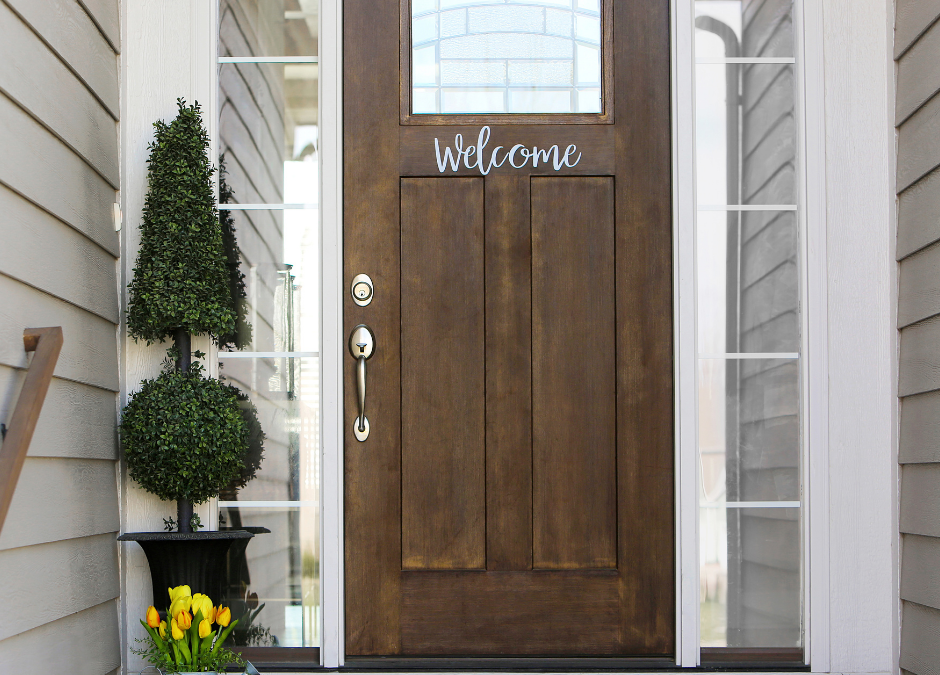Perhaps you have decided to buy a new front door locks. How do you choose the right lock? We will cover how to evaluate locks to find the one that meets your needs. You have a few types of locks with new technology coming in all the time. A word of warning, Consumer Reports did research that found how many of the deadbolts you might buy lack the protection you should expect of them.
Front Door Locks
When it comes to door locks, you have three main types today: conventional and electronic door locks, smart locks and retrofit smart locks. We will speak about each lock to clear the water and help you make a choice.
Conventional and Electronic Door Locks
Don’t expect much flash or convenience, for that matter, but conventional locks still haven’t lost their appeal for a reason. They secure the door without a problem. You have drill-proof models, electronic models with keypads and inexpensive deadbolts found at a standard hardware store. People can buy one of these front door locks for less than they’d pay for other lock types. At the same time, the deadbolt resists unlawful entry. Deadbolts complement the spring bolt lock nicely.
The downside comes from the lack of convenience. While simple, it doesn’t have the features you’d get with a smart lock or a retrofit smart lock.
Smart Lock
Many homeowners have switched to smart locks because they like the convenience and technology it offers. Some of the groundbreaking technological features a smart lock includes are:
- Voice control
- Remote control
- Optional Wi-Fi connectivity
- Access logs
- Geofencing
You have a Bluetooth-only smart lock available that give you a host of features but a limited range. Usually, you need to have a Wi-Fi adapter to bridge the signal and transmit it for features like voice control and remote control. That means extra cost, but you may find the additional features worth it.
The downside of the smart lock comes from how you have to protect on the technological front as well as the mechanical front. It adds more vulnerabilities. Hackers can exploit vulnerabilities to enter the home. Buying reputable a smart lock brand matters if you want this technology to protect.
Retrofit Smart Lock
All of the same features as the smart lock come included, but the retrofit smart lock doesn’t fully replace the deadbolt. A retrofit smart lock only replaces the interior of the deadbolt. While you keep your keys and deadbolt, a retrofit smart lock hands you access to the desired features like auto-unlocking and remote control. You can keep your existing keys and the exterior part of the deadbolt.
Unfortunately, the downside comes from how this lock depends entirely on the strength of your current deadbolt. You don’t want to buy this one if you have a weak deadbolt. Intruders could drill, kick or pick the lock to enter.
Which One Should You Buy?
Looking at front door locks, you have a few things to consider to choose the lock that fits you, such as:
Understanding your budget, a smart lock and a retrofit smart lock will usually cost more than conventional locks because of the extra convenience. That doesn’t mean that they will prove as secure. You have to buy the right brand, or you only receive convenience with them. Along with the budget, look at the features that you want with your front door locks. Conventional locks will usually have the least features, and they will cost the least. A smart lock will offer the most features. Some of the smart lock brands have tamper alarms. This scares off would-be burglars that tamper with your locks.
Finally, consider the security that you require. Some homes only need some security, but you have other homeowners who don’t feel comfortable without the most security. If that’s you, don’t get a smart lock unless you have an expensive one. Even then, the security doesn’t tend to be as good as conventional locks. Having a professional locksmith like the ones from A1 Locksmith Philadelphia can help you pick out a good door lock.
Understanding the Lock Grades
You have three lock grades: ANSI Grade 1, ANSI Grade 2 and ANSI Grade 3. Grade 3 gives you the most basic lock grades, and they won’t protect you from much. They have met the lowest acceptable standard. Grade 2 is usually where you want to be with lock security. It hands you enough security for the average person, but it doesn’t cost as much as ANSI Grade 1. ANSI Grade 1 locks weren’t meant for residential applications, but you could use them if you feel concerned about security. The strongest grade, you can use this for residential applications, but most people use it for industrial and commercial applications.
Avoid Grade 3 locks like the plague if you care anything about security because this lock doesn’t offer it, only a cheaper cost. You will often see the ANSI grade printed on the packaging. This standard form of lock testing has time on its side.
How Strong is the Door Frame?
You could have the best quality lock, but if you have it in a poor door frame, criminals could break in the door frame before the lock breaks. Many times, with the more expensive locks, the homeowner will put concrete in the door frame for extra security.
Getting a good lock comes down to knowing what to look for. If you have any questions, you can ask A1 Locksmith for further information. We can help you to pick out a lock that will meet your security requirements. Finding the right one comes down to understanding what you want in a door lock. Some people will prefer the smart lock, but some people don’t care about the added convenience and want more security. For those people, the conventional lock would do best.

